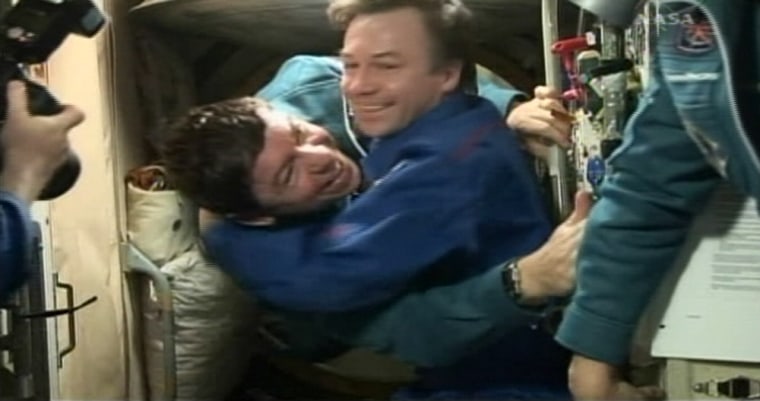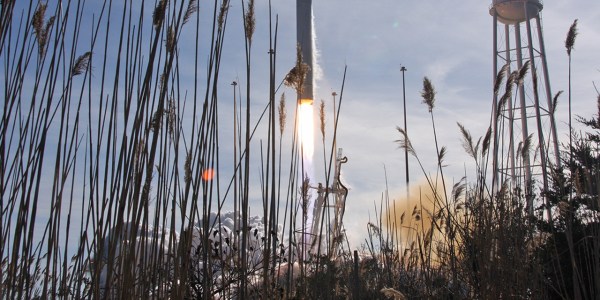A Russian cosmonaut was forced to dock a Soyuz capsule carrying a billionaire space passenger manually at the international space station Saturday after a sensor monitoring the engines apparently malfunctioned.
Engineers played down the incident, but it renewed recent questions about Russia’s otherwise famously reliable spacecraft.
Vladimir Solovyov, flight director for the Russian Space Agency, said that just a few minutes before the docking time an autopilot signal went off showing that one of Soyuz engines might have failed.
Cosmonaut Gennady Padalka reported that the engines were operating normally, and he took manual control of the capsule to keep an emergency computer program from thrusting the engines and sending the craft backing away from the station.
“We took the decision not to allow that,” Solovyov told a news conference at Russia’s mission control in Korolyov, on Moscow’s outskirts.
“We have to figure out what happened,” he said.
The docking by Padalka appeared otherwise smooth and was slightly ahead of schedule, roughly two days after the capsule blasted off from the Baikonur Cosmodrome in Kazakhstan’s barren steppe. Applause broke out among space officials and crew relatives gathered at mission control after the hookup was announced.
Cosmonauts typically receive extensive training in the event that Soyuz’s autopilot fails or some other problem pops up.
“Everyone worked wonderfully, on the ground and on the spacecraft. There were no uncontrolled situations,” said Vitaly Lopota, chief engineer with Soyuz manufacturer RKK Energia.
Padalka and NASA astronaut Michael Barratt are joining the station’s current crew, while software billionaire Charles Simonyi, who is making his second trip as a paying customer to the space station, returns to Earth on April 7 along with cosmonaut Yuri Lonchakov and NASA astronaut Michael Fincke.
Some three hours after docking, the crews opened the hatches and Padalka, Barratt and Simonyi floated in to greet the station’s occupants — Fincke, Lonchakov and Japanese astronaut Koichi Wakata — with hugs, smiles and handshakes.
“We had a great ride up here, and the docking was a little bit of excitement. But we’re very glad to be here, and the station looks great,” Barratt said later in a video hookup with mission control.
“It was an awfully fun ride,” he said, after wishing his wife Michelle a happy anniversary.
Padalka’s young daughter sang a song over the video link, while Padalka played with a small stuffed animal that floated about the station’s compartment.
Simonyi, a Hungarian-born software designer, exchanged greetings with his brother in Hungarian. He also told the folks back home that he was impressed by how much the station has changed since his first trip in 2007.
"I've seen a lot of improvements, and of course the enlargements," he said. "It's an amazing sight."
Last paying passenger?
Simonyi, who made his fortune at Microsoft, may be the last paying customer to travel aboard Russian spacecraft to the station for the foreseeable future, since the station’s permanent crew is expanding from three to six. (Microsoft is a partner in the msnbc.com joint venture.)
Slideshow 12 photos
Month in Space: January 2014
Virginia-based Space Adventures, which brokered Simonyi's journey as well as several other multimillion-dollar trips to the space station over the past eight years, has been trying to arrange at least one more mission for private passengers. Simonyi continued to hold out hope when he spoke from space with his backup cosmonaut trainee, high-tech entrepreneur Esther Dyson.
"I'm so sorry that you couldn't fly," Simonyi told Dyson. "Maybe next time."
Simonyi reportedly paid $35 million for his second trip to space. He plans to conduct medical and radiation experiments, chat with schoolchildren via ham radio, and keep in touch with his family via video stream during his tenure on the station.
The three Soyuz crew arrived three days after the departure of the space shuttle Discovery, following a 13-day mission of which the highlight was the successful installation and unfurling of the station’s last pair of solar wings. Discovery touched down at NASA's Kennedy Space Center just a couple of hours after the Soyuz crew's arrival.
Worries about space workhorse
Russia’s Progress and Soyuz vehicles have long been the workhorses of the space station program, regularly shuttling people and cargo to the orbiting outpost. They took on greater importance when the space shuttle fleet was temporarily grounded in the wake of the 2003 Columbia disaster.
Saturday’s incident was the latest of several mishaps in recent years to hit Russia’s spacecraft, which otherwise have a reputation for reliability and safety.
Last year, a Soyuz capsule returning from the station landed hundreds of miles (kilometers) off target in Kazakhstan after hurtling through Earth’s atmosphere in a steeper-than-normal descent that subjected the crew to severe G-forces.
In 2004, a crew arriving at the space station had to turn off the autopilot on their Soyuz and manually connect to the docking point after a problem resulted in the craft approaching the station at a dangerously high speed.
Associated Press writer Mike Eckel contributed to this report from Moscow.

